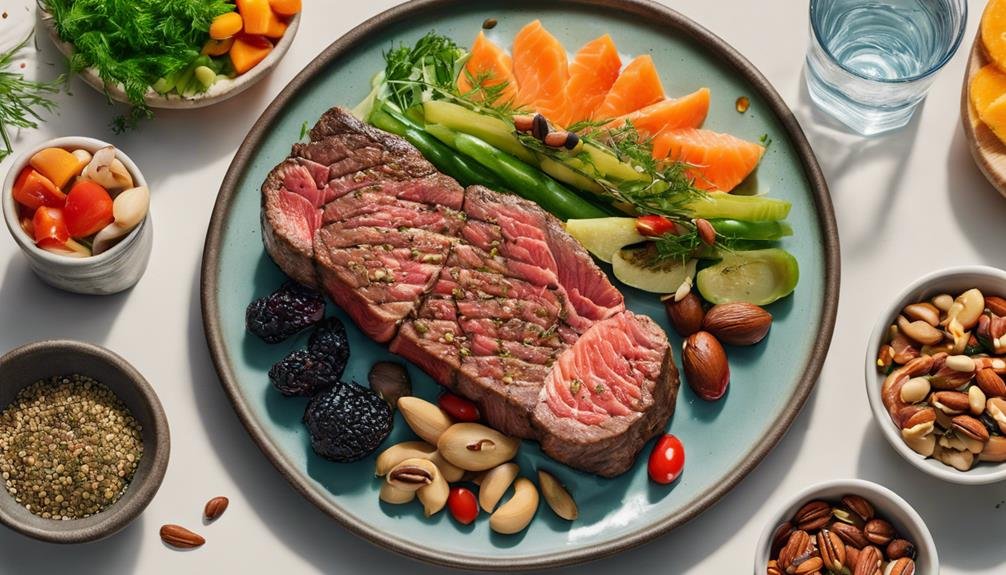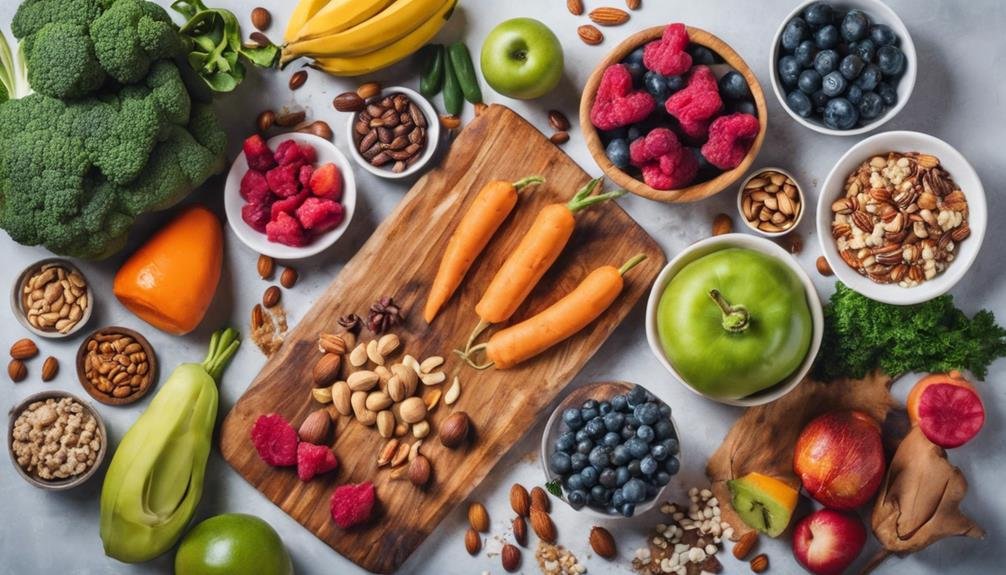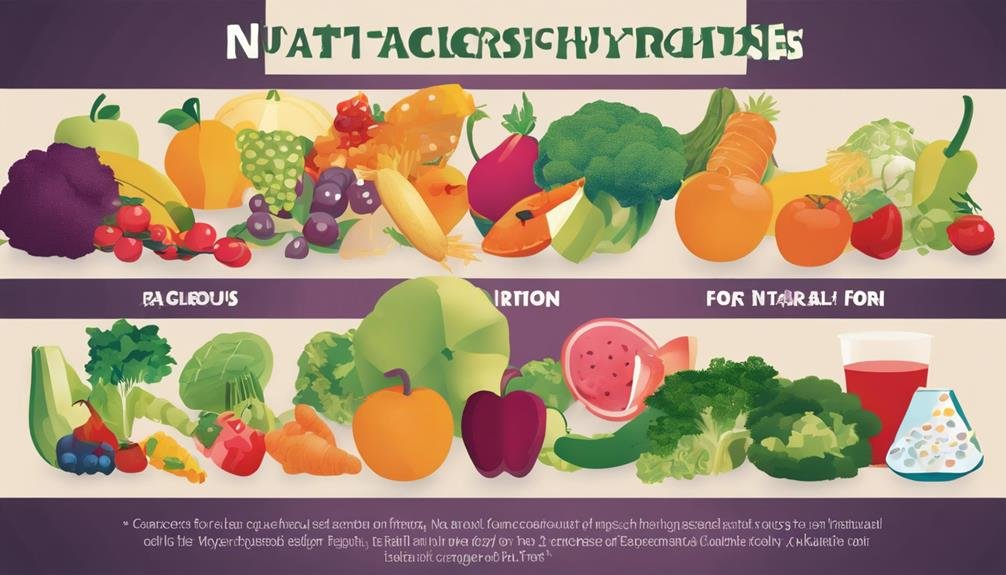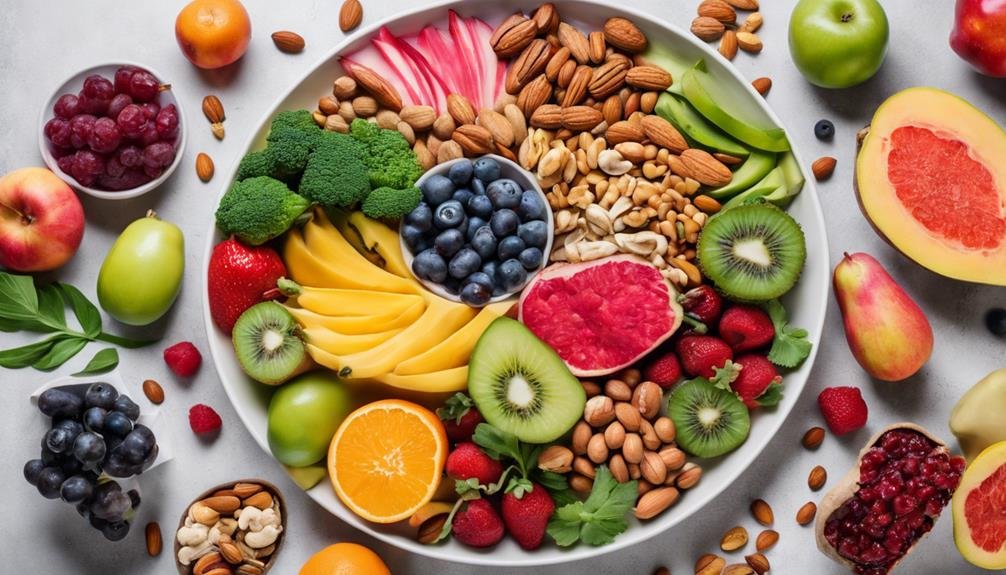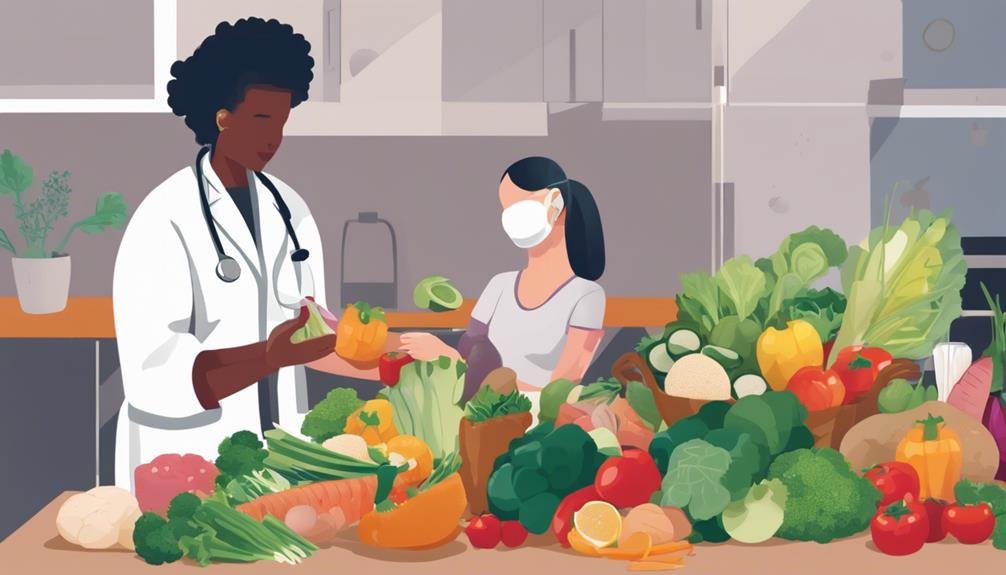Considering an approach to nutrition that aligns with natural principles while supporting your body's recovery from cancer can be a transformative step in your healing journey. The Paleo diet offers a foundation of whole, unprocessed foods that can assist in providing essential nutrients crucial for your immune system and overall well-being. By exploring the key principles of Paleo eating and its impact on inflammation, cellular repair, and energy levels, you might discover the potential benefits of this approach in aiding your cancer recovery journey.
What Is the Paleo Diet?
If you're exploring the Paleo diet for cancer recovery, understanding its core principles is essential.
The Paleo diet, short for Paleolithic diet, mimics the dietary patterns of our ancestors from the Paleolithic era. This diet emphasizes whole, unprocessed foods that our bodies are biologically designed to thrive on. It focuses on consuming lean proteins such as grass-fed meats, poultry, fish, eggs, nuts, and seeds. Vegetables, fruits, healthy fats like avocado and olive oil, and limited amounts of natural sweeteners such as honey or maple syrup are also key components.
The diet excludes processed foods, grains, dairy, and refined sugars, which are believed to contribute to inflammation and other health issues. By prioritizing nutrient-dense foods and eliminating potentially harmful ingredients, the Paleo diet aims to support overall health and well-being.
As you embark on your journey to incorporate the Paleo diet into your cancer recovery plan, remember that choosing high-quality, organic ingredients can further enhance the nutritional benefits of this eating approach.
Benefits of Paleo Eating
To fully grasp the advantages of Paleo eating, it's crucial to understand how this dietary approach can positively impact your health, especially during cancer recovery. The Paleo diet emphasizes whole foods like lean meats, fish, fruits, vegetables, nuts, and seeds while excluding processed foods, grains, and sugars. These nutrient-dense foods provide essential vitamins, minerals, and antioxidants that support your immune system and overall well-being during cancer treatment.
By focusing on whole foods, the Paleo diet helps reduce inflammation in the body, which is crucial for cancer patients as chronic inflammation can hinder recovery. Additionally, this way of eating promotes stable blood sugar levels, which is beneficial for managing energy levels and weight during cancer treatment.
Furthermore, the Paleo diet encourages the consumption of healthy fats such as those found in avocados, olive oil, and fatty fish, which can support brain health and reduce the side effects of certain cancer treatments.
Key Principles of Paleo Nutrition
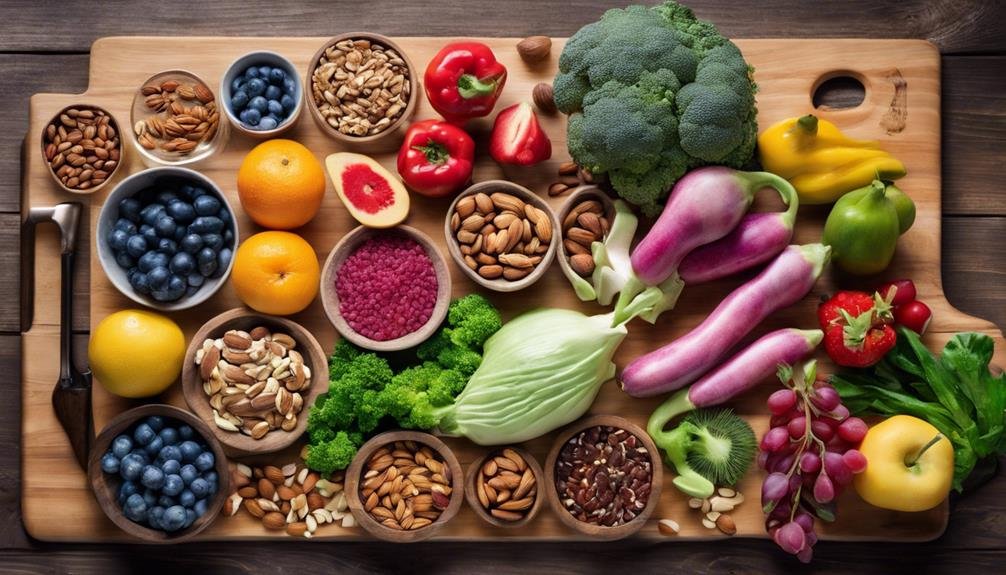
Understanding the fundamental principles of Paleo nutrition is essential for harnessing the full benefits of this dietary approach. The key principles of Paleo nutrition revolve around consuming whole, unprocessed foods that reflect what our ancestors would have eaten. This means focusing on lean meats, fish, fruits, vegetables, nuts, and seeds while avoiding grains, dairy, processed foods, and sugars. By following these principles, you can naturally increase your intake of essential nutrients like vitamins, minerals, and antioxidants, which are crucial for supporting your body during cancer recovery.
Additionally, the Paleo diet emphasizes the importance of high-quality fats, such as those found in avocados, olive oil, and fatty fish, which can help reduce inflammation and support overall health.
It also encourages adequate hydration and mindful eating practices to optimize digestion and nutrient absorption. By adhering to these key principles of Paleo nutrition, you can create a nutrient-dense eating plan that supports your body's healing process and promotes overall well-being.
Importance of Whole Foods
As you navigate your journey towards cancer recovery, the significance of whole foods can't be underestimated. Whole foods, in their unprocessed and natural state, offer a plethora of essential nutrients that are crucial for supporting your body's healing process.
Fruits, vegetables, nuts, seeds, and whole grains are rich in vitamins, minerals, antioxidants, and fiber, all of which play pivotal roles in strengthening your immune system and reducing inflammation.
By incorporating a variety of colorful fruits and vegetables into your daily meals, you provide your body with a spectrum of antioxidants that help combat oxidative stress and promote cellular repair. Furthermore, whole foods are free from additives, preservatives, and artificial ingredients that may hinder your recovery progress.
Embracing whole foods not only nourishes your body but also supports your overall well-being as you combat cancer. Make whole foods the cornerstone of your diet to optimize your nutritional intake and enhance your journey towards healing.
Role of Lean Proteins
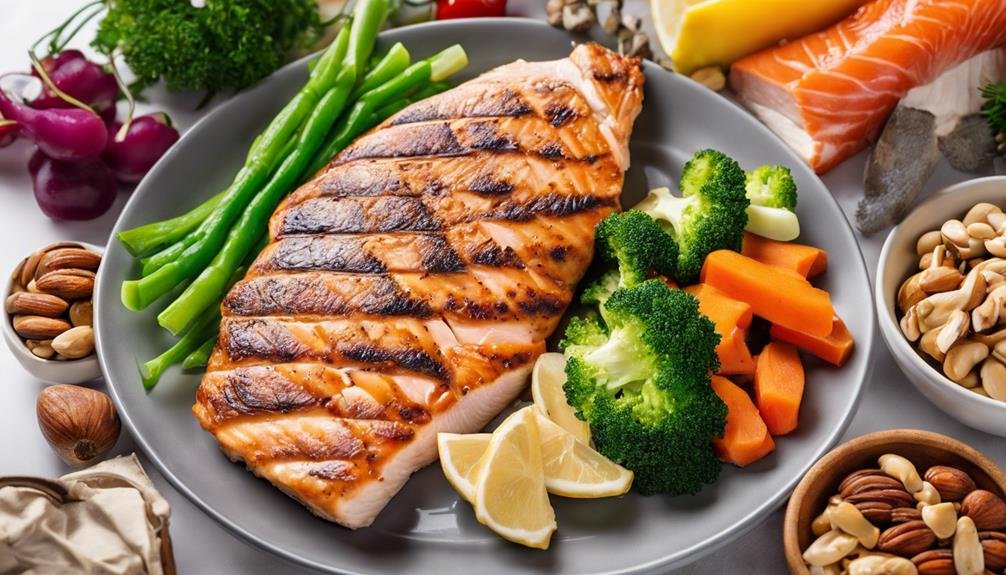
When considering the role of lean proteins in your diet during cancer recovery, it's essential to understand their significance in supporting your body's healing process. Lean proteins, such as chicken, turkey, fish, and legumes, provide amino acids that are crucial for repairing tissues and maintaining muscle mass, which can be especially beneficial during cancer treatment. These proteins also play a vital role in supporting your immune system, helping your body fight off infections and aiding in the recovery process.
Including lean proteins in your diet can help you maintain energy levels and support overall health while undergoing cancer treatment. Opting for lean sources of protein can also assist in managing weight, reducing inflammation, and promoting a sense of fullness after meals.
Remember to choose organic, grass-fed, or wild-caught options whenever possible to minimize exposure to hormones and antibiotics that could potentially interfere with your body's healing process.
Incorporating Vegetables and Fruits
Incorporating a variety of vegetables and fruits into your diet is crucial for supporting your body's recovery during cancer treatment. Vegetables and fruits are rich in essential vitamins, minerals, antioxidants, and fiber that can help boost your immune system, reduce inflammation, and aid in overall healing. Aim to include a colorful array of produce in your meals to ensure you're getting a wide range of nutrients.
Dark leafy greens like spinach and kale provide iron and folate, while berries offer powerful antioxidants. Cruciferous vegetables such as broccoli and cauliflower contain compounds that may help protect against cancer cell growth.
Try to consume a mix of both raw and cooked vegetables and fruits to benefit from their different nutrient profiles. Raw vegetables retain more vitamin C, while certain nutrients in cooked vegetables become more bioavailable. Smoothies, salads, stir-fries, and roasted vegetable medleys are delicious ways to incorporate these cancer-fighting foods into your daily diet.
Nuts and Seeds for Nutrient Boost
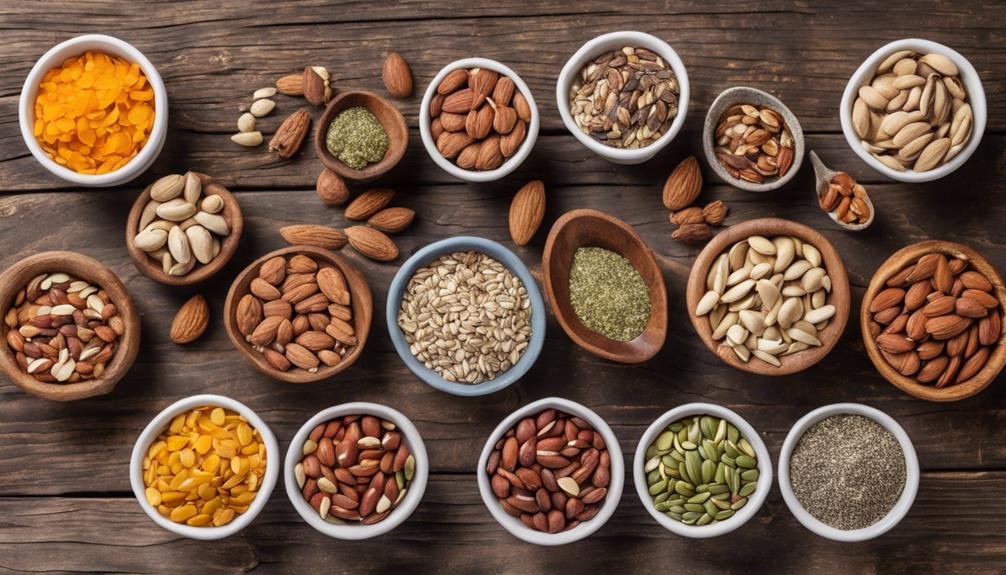
For a nutrient boost that can aid in your cancer recovery journey, consider incorporating nuts and seeds into your daily diet. Nuts and seeds are packed with essential nutrients like healthy fats, protein, fiber, vitamins, and minerals that can support your overall health and well-being during this challenging time.
Almonds, walnuts, chia seeds, flaxseeds, and pumpkin seeds are excellent choices to include in your diet. Almonds provide vitamin E, walnuts offer omega-3 fatty acids, chia seeds are rich in fiber, flaxseeds contain lignans that have antioxidant properties, and pumpkin seeds are a good source of zinc. These nutrients play crucial roles in immune function, inflammation reduction, and overall cellular health.
Incorporating a variety of nuts and seeds into your meals or snacks can help you meet your nutrient needs and support your body's healing process. Remember to consume them in moderation as part of a balanced diet to maximize their benefits without overdoing it.
Avoiding Processed Foods
To support your cancer recovery journey, it's crucial to prioritize avoiding processed foods in your diet. Processed foods often contain high levels of unhealthy fats, sugars, and additives that can negatively impact your health and hinder your body's recovery process. By steering clear of processed foods, you can focus on consuming nutrient-dense whole foods that provide your body with the essential vitamins, minerals, and antioxidants it needs to combat cancer and promote healing.
Opting for fresh fruits and vegetables, lean proteins, and whole grains instead of processed snacks, sugary beverages, and pre-packaged meals can help reduce inflammation, support your immune system, and improve your overall well-being.
Additionally, avoiding processed foods can lower your intake of refined carbohydrates and artificial ingredients, which have been linked to an increased risk of chronic diseases, including cancer.
Impact of Sugar Reduction

Reducing sugar intake can have a significant impact on your cancer recovery journey. Sugar consumption has been linked to inflammation, insulin resistance, and increased cancer cell growth. By reducing your sugar intake, you can create a less favorable environment for cancer cells to thrive. High sugar intake can lead to weight gain and fluctuations in blood sugar levels, which may negatively impact your overall health and well-being during cancer treatment.
When you cut back on sugary foods and beverages, you aren't only supporting your body's natural ability to fight cancer but also promoting a more stable and balanced internal environment.
Opting for whole foods like fruits, vegetables, lean proteins, and healthy fats can help regulate your blood sugar levels and reduce the inflammatory response in your body. Making these dietary changes can aid in managing symptoms, supporting your immune system, and enhancing your overall quality of life as you navigate through your cancer recovery journey.
Paleo Diet and Inflammation
Inflammation plays a crucial role in the body's response to cancer and overall health. The Paleo diet, rich in whole foods like lean proteins, fruits, vegetables, nuts, and seeds, has been shown to help reduce inflammation. By eliminating processed foods, sugars, and refined carbohydrates, the Paleo diet can support a balanced inflammatory response in your body.
Foods like grass-fed meats and fatty fish provide omega-3 fatty acids, which have anti-inflammatory properties. Additionally, fruits and vegetables high in antioxidants help combat oxidative stress, a common trigger for inflammation. Nuts and seeds offer healthy fats and minerals that further support a healthy inflammatory balance.
Adopting a Paleo lifestyle can help regulate inflammation, potentially aiding in cancer recovery and overall well-being. By nourishing your body with nutrient-dense foods, you're providing it with the tools it needs to fight inflammation and support optimal health. Consider incorporating more Paleo-friendly options into your diet to promote a healthy inflammatory response and support your body's natural healing processes.
Supporting Immune Function

Given the close relationship between inflammation and immune function, it's important to consider how the foods you consume can impact your body's ability to fight off illnesses and support recovery.
A paleo diet rich in whole foods like fruits, vegetables, lean proteins, and healthy fats can provide essential nutrients that support a healthy immune system. Antioxidants found in colorful fruits and vegetables help reduce oxidative stress and inflammation, key factors in supporting immune function.
Lean proteins like fish, poultry, and grass-fed meat provide amino acids necessary for immune cell production and function.
Healthy fats from sources like avocados, nuts, and olive oil support immune health by reducing inflammation and aiding in the absorption of fat-soluble vitamins.
Paleo Eating Tips for Cancer Recovery
To support your body's recovery from cancer, adopting a paleo eating approach can play a crucial role in providing essential nutrients and promoting overall health. When focusing on cancer recovery, consider these tips for a successful paleo diet.
- Emphasize consuming whole foods such as lean meats, fish, fruits, vegetables, nuts, and seeds. These foods are rich in vitamins, minerals, antioxidants, and healthy fats that can support your immune system and aid in healing processes.
- Opt for organic and grass-fed options to reduce exposure to harmful chemicals and maximize nutrient intake.
Limit processed foods, sugar, and refined carbohydrates, as these can contribute to inflammation and hinder your recovery progress. Stay hydrated by drinking plenty of water throughout the day to support detoxification and overall health.
Prioritize quality sleep and stress management to further enhance your body's healing capabilities. Consult with a healthcare provider or a nutritionist for personalized guidance on implementing a paleo diet tailored to your specific needs during cancer recovery. By following these tips, you can optimize your nutrition and support your body's journey towards healing.
Frequently Asked Questions
Can the Paleo Diet Cure Cancer?
You may have heard claims about the paleo diet curing cancer, but it's crucial to approach such statements with caution. While a healthy diet can play a supportive role in overall health and recovery, there's no scientific evidence proving that the paleo diet alone can cure cancer.
Always consult with medical professionals for the best treatment options and focus on a balanced approach to nutrition while undergoing cancer treatment.
Are Supplements Necessary on a Paleo Diet?
Supplements might be beneficial on a paleo diet, but not always necessary. While focusing on whole foods is key, some individuals may require specific nutrients that are hard to obtain solely from food.
For example, Omega-3 fatty acids can be lacking in some diets and may need supplementation. Consulting with a healthcare provider or a nutritionist can help determine if supplements are needed to support your overall health and well-being on a paleo diet.
How Can I Eat Out While Following Paleo?
When eating out on a paleo diet, opt for protein-rich dishes like grilled meats or fish and plenty of vegetables. Skip processed foods and ask for substitutions like extra veggies instead of grains or bread. Choose salads with olive oil and vinegar dressings, or grilled vegetables as sides. Inform the server about your dietary preferences to ensure your meal is prepared without hidden ingredients. Remember, staying mindful and making informed choices can help you enjoy dining out while following the paleo lifestyle.
Can I Drink Alcohol on a Paleo Diet?
Absolutely! While on a paleo diet, you can enjoy alcohol in moderation. Keep in mind that some options like red wine or clear spirits are lower in sugar and additives. However, it's essential to listen to your body and choose wisely.
Interestingly, a survey found that among paleo followers, about 52% reported including alcohol occasionally in their diet. Remember, balance is key, so enjoy responsibly and consider how alcohol fits into your overall health goals.
Is It Possible to Gain Weight on a Paleo Diet?
Yes, it's possible to gain weight on a paleo diet if you consume more calories than your body burns. While the paleo diet emphasizes whole foods like lean proteins, fruits, and vegetables, it's still important to be mindful of portion sizes and overall calorie intake. Incorporating physical activity and balancing your macronutrient ratios can help manage your weight effectively while following a paleo eating plan.
Conclusion
In conclusion, embracing a Paleo diet can serve as a powerful ally in your journey towards cancer recovery. By nourishing your body with nutrient-dense whole foods and eliminating inflammatory culprits, you are providing your cells with the necessary support for healing and immune function. Remember, as you navigate this challenging terrain, let the Paleo diet be your guiding light, shining brightly with the promise of natural nutrition to fuel your battle against cancer.
